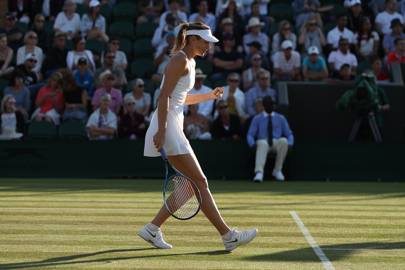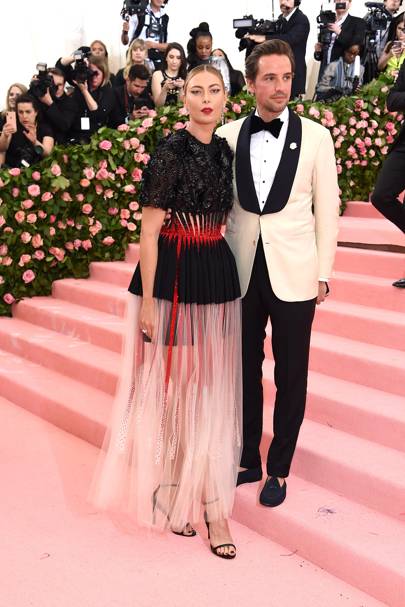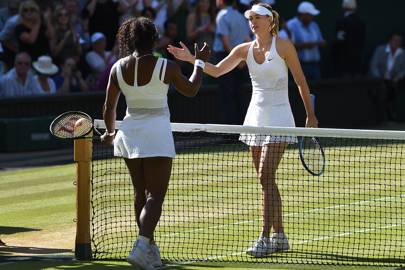‘I’m fighting for equality!’ Maria Sharapova gets real about equal pay, body image and mental wellbeing

Maria Sharapova practically defines the term 'determination'. As a six-year-old Russian girl who spoke practically zero English, she and her father arrived in USA with only the money in their pocket and one dream: to turn Maria into a champion.
WATCH: Maria Sharapova's empowering interview on body image, mental wellbeing and being a badass business woman
Now 31 years old, Marias achievements speak of someone who has lived an entire life. Shes won every single tennis Grand Slam title, with a tally of titles to date. Her wealth of sporting endorsements, from Nike to Evian, have turned her into the highest-paid sportswoman in the world for 11 consecutive years. And now, whilst she still slays it on the court, she has embarked on yet another path: a businesswoman as the founder of confectionary line, Sugarpova.
Advertisement
Meeting Maria Sharapova in real life is like having an audience with the Oprah of sport. Empowerment practically punctuates her every conversation. And here, Maria opens up about her journey with body image – her mother gave her carrot juice to make here grow (who knew), how she works on her own mental health and why the highs and the lows of her career are still in front of her…
What has determination taught you about your self?
The sport itself – from starting at a very young age – is all about repetition, focus and grind because it was all about numbers. The more you did, the better you became, the more confident you became at a shot or stroke. That mentality grew over time and its taking me to different parts of my career in business with Sugapova, for example. There are so many things in a sporting career you learn along the way that sometimes dont help you with the sport itself but outside the sport.
Whats the greatest sacrifice youve had to make?
Being away from my family for a long period of time is really tough. I moved to the US from Russia when I was 6 years old and I didnt see my mum for the first two years. There are no guarantees in tennis, theres no guarantees in life. When youre young, you do everything you can to become a champion and you try to get the best resources and the best coach and the best people around to make you a champion, but you never know. You can take any path in life and sometimes they lead you to the wrong destination. You commit yourself mentally and financially with the people around you for this one goal and you never know if its going to work out.


Getty Images
Advertisement
What have you learnt about yourself in those moments of sacrifice?
The way I handle a situation that comes at me, for example losing a match that was really tough and I was up and ahead and I ended up losing at the end, the way I come off the court, the way I think about it mentally and process it. I take it not as failure but something that didnt work out and what can I become better at. If I can think about it like that in my sporting world, Ill be able to take those few little things and bring it into my life, my personal life and my business. So much of life is about perspective.
How do you look after your mental wellbeing?
I like to read a lot to calm down. When Im on the court, everything is about that moment. Sometimes the crowd is drinking their Pimms and eating strawberries. But you know how important that point is, but they dont actually recognise it. Youre like, get with the programme everyone! I love being focused. I have a determination for what I do, and Im certainly not shy to show it. I perform, Im an entertainer and I like to give everything Ive got. Everyone is always a work in progress and theres some things Im good at and some things Im fragile.
These are the indispensable tools that help me cope with my anxiety and panic attacks
What is your most fragile?
When Im impatient. By doing well, you want to see results and this sport consistently teaches me it doesnt come overnight. It takes time so Im always itching to see what comes out of the work I put in. It always comes in at very different times to what I imagined.
Advertisement
If someone was lacking determination, what would you say?
Keep doing it. Sometimes it only takes a few people to tell you they believe in you and for all the others that dont, its the people that know you and matter to you. Their determination is much more valuable because of the years they spent with you and they know you inside and out.


Getty Images
Can you remember a time your support network has picked you up?
Always. Im an only child so Im a golden child where so much of their life is focused on me, especially when I was younger. My father was my coach, my mother did everything in order to make me comfortable. She made me carrot juice in the morning because I was short, and she thought that if I drank carrot juice, Id be taller for my sport because I needed that. They're always there. My friends are incredible, I have a great team around me that push me. I see more of my professional tennis team than I see my family because were in it every single day, all hours. You travel together, train together so your interests become intertwined.
You always have promoted a healthy, strong body image. But whats your journey with body image been like?
I was a lot taller and very skinny when I was young, so I was wobbly, and I didnt always feel stable. I was an odd one out. I was doing well and training so much and beating a lot of older girls and I dont think that was very popular. I felt like I was on a mission to become a professional athlete and that was waking up early in the morning and training and going to sleep early. I didnt have access to a lot of things. There werent many sleepovers or trips to the mall. So, I wasnt really ever affected by that.
We all suffer with moments of being body conscious – but you have to go out there and compete in short dresses. How do you overcome that?
You have to go with it. Ive been so fortunate. Ive worked with Nike ever since I was 11 so I have their trust in what they are creating. Ive worked with their designers for so many years. When I go onto the court, I know I have something beautifully made with beautiful material thats been engineered particularly for sport. When youre out and sweating and trying to beat your opponent, you dont think about your body.
Stylish sportswear that will *actually* make you want to hit the gym ASAP
You have risen to the top of your sport, but you still get asked so many sexist questions. With people saying you are too emotional, or not emotional enough. Those kinds of emotive questions arent asked of men. How do you deal with these questions? How does it make you feel?
Ive been prepared ever since I was young. With tennis we have to go to a press conference whether weve won or lost with every single match. Journalists can come in there and theres no boundaries, guide or rulebook. They can ask you whatever you want whether its professional or personal. Sometimes you go in after a match and you dont get one question about the match. Im there to try and win a tournament but thats a very small part of it. You have to go in there and be professional. Questions can get tricky and they might not fall in line with what you have prepared for them to ask you and thats ok. Thats how life is. You get things thrown at you and you have to deliver and accept them.
Is there a sexist question that annoys you most?
No. If you look at the trajectory of an athletes career, its such a small part of our life. 10 or 15 minutes later, you go home and youre with your family or loved one is sick, theres more important things in life we have to worry about. Yes, you get faced with questions that are uncomfortable or you dont feel good about, but you have to face them and give them your perspective.
You are the second highest sportswoman in the world and yet the equal pay debate in tennis is still raging on. How do you find that debate?
I still feel like its a debate. Female athletes are fighting for that equality, which is the right thing to do but is it right to still be doing it in 2019? No! Its another thing we have to fight for, and we do because its part of our profession and part of our life. I want equality across the entire board and across all sports.
When it comes to Sugarpova how has it been being a female businesswoman?
I love being a female businesswoman in the candy world because its completely different to my day job. Whats been interesting is coming into a career in which I didnt have a lot of knowledge. From that perspective, that was difficult, but I forced the questions that men and maybe women didnt think about because they were in there every single day so that I enjoy. Ive learnt a lot; I know what works and what I want to do with it.
What's the biggest thing youve learnt about yourself through becoming a business woman?
Ive learnt to take responsibility. When youre on a call and a lot of the time theyre a lot older than I am that are much more experienced in the industry, but I feel like I have to take the lead and Ive learnt how to handle that. I want to give people the space to contribute to my company, but you are the driver of it.


Getty Images
How do you focus when you have so much going on at once?
I have one priority. Thats always been my sport. The feeling of being an athlete. When you used to travel and you have to fill out immigration forms and it says what is your occupation, my favourite thing was to write, athlete. When I wake up and put on my sports gear, I love the feeling of knowing I was be better at my craft. With that in mind, Ill wake up and do a few work emails unrelated to my sport, but Ill get on the court and Ill train, and my mind is 100% there. When Im off it, theres not much I can do so I like challenging myself and putting on my businesswoman hat on. Its nice to have other things going on in your life. Its helped me become better at my sport.

















